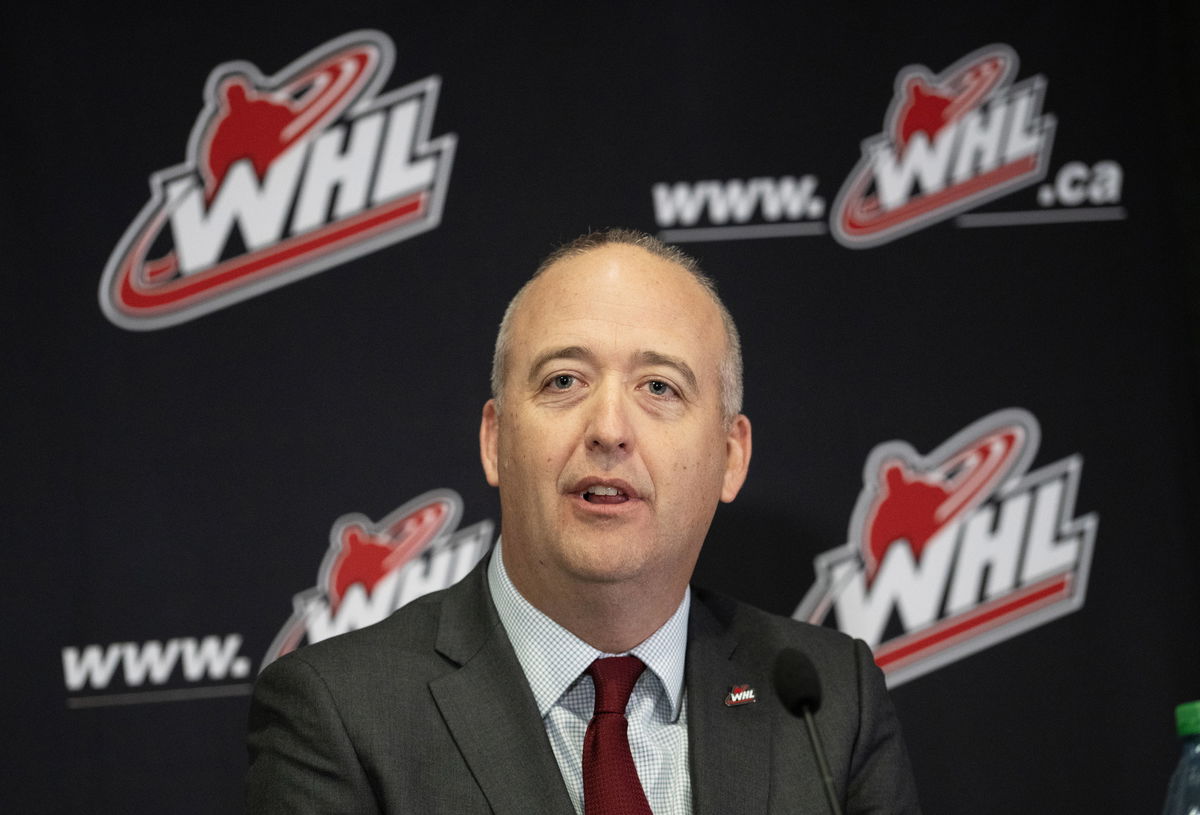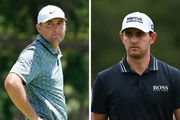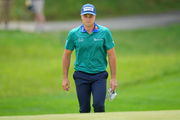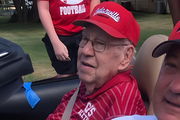
Imago
November 30, 2023, Calgary, AB, CANADA: Dan Near speaks at a news conference after being announced as the new WHL Commissioner in Calgary on Thursday, November 30, 2023. Canada News – November 30, 2023 PUBLICATIONxINxGERxSUIxAUTxONLY – ZUMAc35_ 20231130_zaf_c35_066 Copyright: xToddxKorolx

Imago
November 30, 2023, Calgary, AB, CANADA: Dan Near speaks at a news conference after being announced as the new WHL Commissioner in Calgary on Thursday, November 30, 2023. Canada News – November 30, 2023 PUBLICATIONxINxGERxSUIxAUTxONLY – ZUMAc35_ 20231130_zaf_c35_066 Copyright: xToddxKorolx
It started like any other interview. WHL Commissioner Dan Near was a guest on The Pipeline Show with Guy Flaming, talking about player development and the choices young prospects face. But things took a sharp turn when Near launched into a pointed critique of the NCAA route, which has been growing in popularity among junior players. The NCAA is “business class,” he said. “Playing a Friday and Saturday schedule and then pumping iron and drinking smoothies all week will make you soft and ill-prepared for professional hockey.” So, he was actually criticizing the NCAA hockey system for being too comfortable and cushy. But the timing couldn’t be more sensitive, especially as more NHL teams increasingly scout NCAA players
Watch What’s Trending Now!
As the NCAA is allowing CHL players to play in the U.S. college ranks starting in the 2025–26 season, after making a rule change late last year, the comment was widely seen as a not-so-subtle dig at those players, and it didn’t go unnoticed. Among the loudest critics was Allan Walsh, one of the most powerful agents in hockey and Co-Managing Director of Octagon-Hockey. Walsh, never shy about standing up for players, responded sharply to Near’s comments. “This is not the message to be sending,” Walsh posted on X. “The WHL will slowly bleed out and lose power, prestige along with all their top players by mocking those who leave to play NCAA as soft. NHL teams LOVE the top NCAA schools as model hockey development programs.”
And Walsh wasn’t done. He used the moment to call out WHL policies that he sees as outdated or even harmful to player development. “The WHL should allow teams to reimburse $2000 per player for summer training like the OHL/QMJHL instead of banning it league-wide,” he added. “In no world should the WHL be selling 12 hr bus rides as character-building opportunities. Either invest in the players or slowly fade away.” The message was clear: players today are looking for development, support, and balance, not just old-school toughness for the sake of it.
ADVERTISEMENT
This is not the message to be sending. The WHL will slowly bleed out and lose power, prestige along with all their top players by mocking those who leave to play NCAA as soft. NHL teams LOVE the top NCAA schools as model hockey development programs. 1/2 https://t.co/juLdvqKxl5
— Allan Walsh🏒 (@walsha) July 17, 2025
That jab was actually aimed squarely at Near’s controversial claim, where he said NCAA players are pampered and warned that charter flights and well-funded programs “deny you the character-building opportunities of twelve-hour bus trips through Saskatchewan in January,” as it was shared by Greater Alberta College Hockey on X. For NHL agent Walsh, framing long, grueling travel as a developmental virtue was more than just old-school; it was irresponsible. His message was unmistakable: in today’s game, players want high-performance environments, not manufactured adversity. Holding up hardship as a selling point, especially in contrast to well-supported NCAA programs, might not build character, but it could cost the WHL its top talent.
This whole dust-up has reignited the long-running debate in hockey circles about which path really prepares players best for the NHL. However, what’s shocking now is that Dan Near’s recent stance appears to contradict what he initially supported.
ADVERTISEMENT
Dan Near’s quiet but meaningful rebuild of the stepping stone to the NHL
Near officially became WHL Commissioner in October 2023, taking the reins during a critical period for junior hockey in North America. His tenure began just months before the NCAA reversed a long-standing rule in late 2024, allowing CHL players to retain eligibility and compete in U.S. college hockey beginning in the 2025–26 season. Near initially welcomed the change with a cautiously optimistic tone, calling it a ‘historic and consequential outcome’ that would provide greater choice for young players and even stated that it meant the WHL could now become ‘the preferred destination for their development … without fear of compromising their NCAA eligibility.’ With the NHL increasingly drafting talent from both the CHL and NCAA, Near’s early comments aligned with a progressive vision. Before all else, his impact as WHL Commissioner is hard to overlook.
ADVERTISEMENT
Dan Near’s leadership has brought a renewed focus on both player development and community connection. Off the ice, the league reinforced its educational commitment, with 378 former WHL players receiving over $2.7 million in scholarship support during the 2024–25 season. Beyond policy, Near has pushed to strengthen the league’s identity at the grassroots level. In his first six months, he has planned on visiting all 22 WHL markets, promoting local storytelling and community engagement. He’s emphasized the importance of connecting fans with player journeys, encouraging a more personal and immersive fan experience.
Top Stories
PGA Tour Pro Loses His Cool After Being Denied Entry Into WM Phoenix Open Field

Giannis Antetokounmpo All but Confirms Warriors Trade With 6-Figure Decision: NBA Rumor

Patrick Cantlay & Scottie Scheffler Disapprove of Controversial Change Happening to PGA Tour Courses

U.S. Senator Announces Bad News For NFL Fans After Donald Trump’s Ruling on ESPN’s Billion-Dollar Takeover

Brooks Koepka’s Unscathed Return Upsets Viktor Hovland as PGA Tour Pro Refuses to Hold Back

Ohio High School Football Coach Dies at 90, After Serving Community for 32 Years

Near has also prioritized culture-building through an expanded Respect in Hockey program, mandatory for all league personnel, that focuses on inclusion, safety, and behavioral education. These efforts show his broader mission: modernize the WHL, which is the key to the NHL, while preserving its core values.
ADVERTISEMENT
ADVERTISEMENT
ADVERTISEMENT